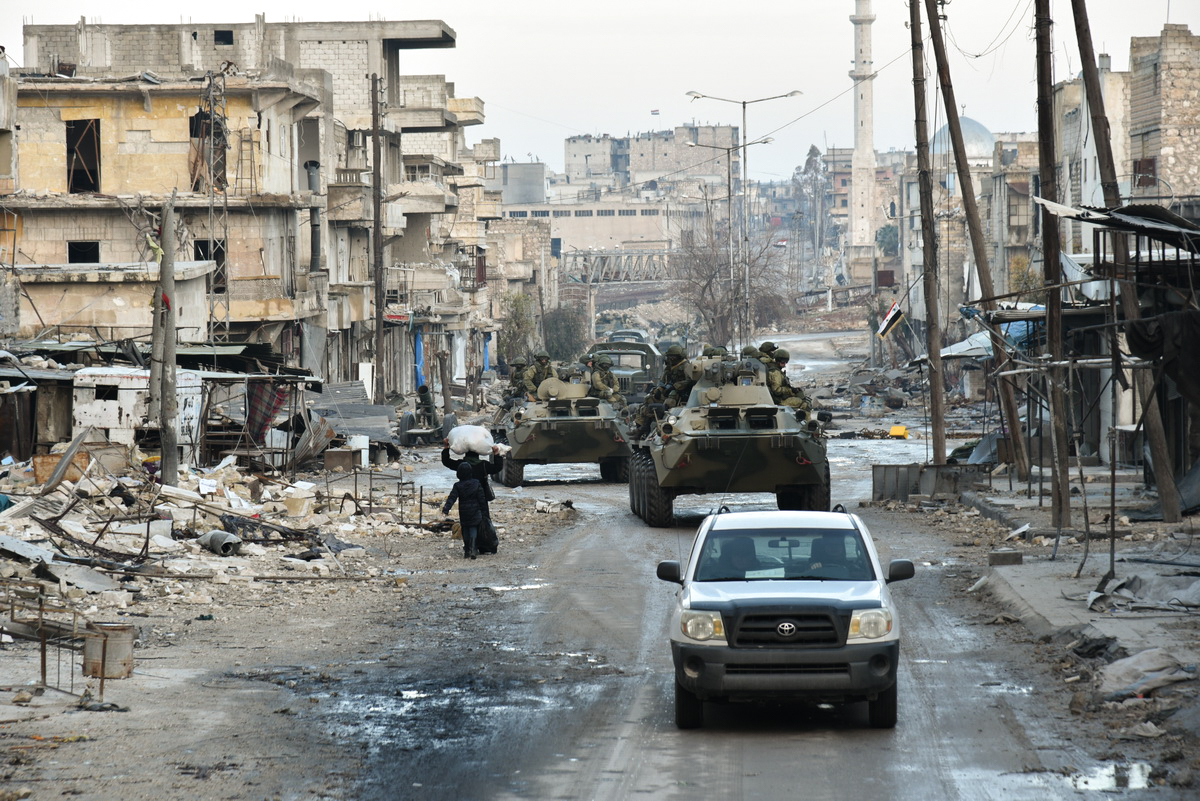
International Mine Action Center in Syria (Aleppo), December 23, 2016 (Source: Ministry of Defence of the Russian Federation/Wikimedia Commons)


International Mine Action Center in Syria (Aleppo), December 23, 2016 (Source: Ministry of Defence of the Russian Federation/Wikimedia Commons)

 Our Concerns
Our Concerns
|
As the Syrian conflict entered its seventh year in March, civilians continued to be the main victims of egregious violations of human rights and humanitarian law. It is estimated that more than 465,000 people have been killed or have gone missing in Syria since 2011. Moreover, according to the UN Refugee Agency, over five million people have fled the country since the beginning of the hostilities, seeking safety in Lebanon, Turkey, Jordan and beyond, while more than six million people are internally displaced. In total, half of the Syrian population has been displaced.
This year, civilians continued to be indiscriminately targeted by all parties to the conflict. Further violations include the use of chemical weapons: on April 4, nearly a hundred people died due to an attack by the Syrian air force in the opposition-held town of Khan Sheikhoun. The Organisation for the Prohibition of Chemical Weapons (OPCW) later confirmed that people had been exposed to sarin gas. A few days after the attack, the United States launched a strike against an airbase from where it alleged the chemical weapons attack was carried out. Over the course of 2017, attempts by the UN Security Council to adopt resolutions either to sanction the Syrian government for its use of chemical weapons or to extend the OPCW investigation were systematically vetoed by Russia.
Following talks held in Astana, Kazakhstan in September 2017, Russia, Turkey, and Iran signed an agreement establishing four de-escalation zones aimed at the cessation of hostilities between government forces and opposition armed groups in eastern Ghouta, in the suburbs of Damascus, as well some parts of the provinces of Idlib, Homs, Latakia, Aleppo and Hama. Despite this agreement, the Syrian government has refused to lift the five-year long siege on eastern Ghouta, resulting in a humanitarian disaster for the 400,000 civilians – accounting for nearly 95% of the country’s besieged population – who remain trapped without access to food or medical care. In November, hostilities critically escalated with Syrian government and Russian forces carrying out intense shelling and air strikes.
On the eastern side of the country, the Syrian Democratic Forces (SDF) – a coalition dominated by its Kurdish component and backed by the United States – ousted the Islamic State (IS) from its stronghold of Raqqa. The offensive resulted in a large number of deaths of civilians who were prevented from fleeing the area by IS. In August alone, over a hundred people were killed as a result of air strikes and ground-based attacks.

In 2017, international human rights and humanitarian law continued to be blatantly violated in Syria. In its latest report published on September 6, the UN Independent International Commission of Inquiry (CoI) found that all the parties to the conflict “continue to perpetrate unthinkable crimes against civilians in and away from the battlefield in blatant violation of international law, including forced displacement, deliberate attacks against civilians, and the use of chemical weapons.”
“In 2017, international human rights and humanitarian law continued to be blatantly violated in Syria.”
Indeed, government forces conducted disproportionate and indiscriminate military operations in rebel-held areas. In particular, they carried out indiscriminate attacks in densely populated areas, especially through the use of illegal weapons such as barrel bombs, cluster munitions and chemical weapons, causing the death of thousands of people.
On April 4, over 90 people, including children, were killed by sarin gas during a Syrian army airstrike on Khan Sheikhoun in the Idlib Governorate. The relatives of 12 of these individuals contacted Alkarama and Human Rights Guardians, which in turn submitted their case to the UN Special Rapporteur on extrajudicial, summary or arbitrary executions and to the CoI.
Furthermore, the CoI’s report addressed the human rights violations committed by non-state armed groups that have been involved in sectarian violence.
Russian and U.S. air forces have been accused of failing to take all feasible precautions to protect civilians and civilian objects when attacking armed groups. In particular, Russian airstrikes are responsible for thousands of civilian deaths; such indiscriminate attacks conducted by international parties to the conflict on the civilian population may constitute war crimes.
Lastly, the CoI denounced the evacuation agreements that have resulted in the forced displacement of civilian populations for political gains. A number of local truces between pro-government forces and armed groups, including the so-called “Four Towns Agreement,” have led to the forced displacement of thousands of civilians. This practice can be considered a war crime, as international humanitarian law stipulates that parties to a non-international armed conflict must not order the displacement of the civilian population for reasons related to the conflict.
Since 2011, the Syrian authorities have never cooperated fully with the CoI. On March 16, when the Human Rights Council adopted Syria’s Universal Periodic Review outcome, the authorities clearly rejected the large number of recommendations calling for full collaboration with the CoI.

The practice of enforced disappearance in Syria is widespread and systematic, and amounts to a crime against humanity. It is used as a tool of terror, and tens of thousands of men, women and children from all backgrounds have been targeted. When the Human Rights Council adopted Syria’s Universal Periodic Review outcome on March 16, the authorities expressed their “readiness” to ratify the International Convention for the Protection of All Persons from Enforced Disappearance, but rejected all recommendations aimed at stopping this practice on the grounds that they were “unfounded”. On the contrary, the authorities alleged that the whereabouts of the detainees arrested by the authorities, their legal status and the charges against them were always communicated.
In 2017, Alkarama, along with the civil society organisations Human Rights Guardians and Urnammu for Justice and Human Rights, submitted numerous cases of enforced disappearance to the UN Working Group on Enforced or Involuntary Disappearances (WGEID). As of May 2017, the cases of 218 victims whose fate had yet to be clarified by the authorities were still outstanding before the WGEID. However, this is only a fraction of the tens of thousands of cases of enforced disappearances in the country.
“The practice of enforced disappearance in Syria is widespread and systematic, and amounts to a crime against humanity.”
Among these cases of enforced disappearances was that of Ruba Bakkar and her two young children Ahmad, aged 11, and Maram, aged 9. In July 2013, they were travelling from Homs, where they were living in a camp for internally displaced persons, to the opposition-held Jairoud area to visit their husband and father for the month of Ramadan. Stopped at a checkpoint, the driver called Ruba’s husband, informing him that his wife and children had arrived. Fearing this was a trap, he requested to speak to his wife directly, but when the driver handed the phone over to Ms Bakkar, she refused to talk to him in order to protect him, confirming his fear that she and the children had been arrested by government forces. The driver also disappeared that day.
Since then, Ms Bakkar’s husband has not been able to communicate with his wife and children. He was only informed that his wife was detained at the investigation branch of the Military Intelligence. Ms Bakkar’s mother lodged a complaint with the military police in Qaboun in June 2014. The officers told her to come back every month, which she continued to do until her health no longer allowed her to make the journey. In spite of these repeated attempts, she was never provided with any information regarding the fate and whereabouts of her daughter and grandchildren.

|
On August 1, Bassel Khartabil Safadi’s wife, Noura Ghazi Safadi, confirmed in a statement that her husband had been secretly executed soon after his disappearance from Damascus’ Adra prison in October 2015. Khartabil was 34-years-old at the time.
Palestinian-born Khartabil was the co-founder of Aiki Lab, a youth community technology space or “hacker space,” which he was running at the time mass protests broke out against Bachar Al Assad’s regime in 2011. He was also committed to supporting open web technologies and a free internet by promoting digital literacy and education about social media and open-source tools across the Arab world. In recognition of his work, he was named by Foreign Policy as one of its Top 100 Global Thinkers of 2012. He is also the recipient of Index on Censorship’s 2013 Digital Freedom award.
On March 15, 2012, as he was leaving work in the Mezzeh district of Damascus, Bassel was arrested by members of the Military Intelligence and taken to an unknown location. Following nine months of secret detention, a military prosecutor charged him with “spying for an enemy State” under articles 272 and 274 of the Syrian Criminal Code, and referred the case to a military court. In April 2015, upon Alkarama’s request, the UN Working Group on Arbitrary Detention adopted an Opinion which considered his detention “arbitrary” and called for his immediate release. However, the Syrian authorities did not implement the UN recommendations, and Khartabil remained detained in Adra prison.
On October 3, 2015, while still awaiting trial, Khartabil was transferred from Adra prison, disappearing from official records. Worried about his fate and physical integrity, Alkarama requested the urgent intervention of the UN WGEID, which called upon the Syrian authorities to disclose his whereabouts. Syria never responded to the UN group of independent experts.
Notwithstanding international pressure, notably through the #FreeBassel campaign, the Syrian authorities executed Khartabil shortly after his transfer from Adra prison. To date, the Syrian authorities have not confirmed his death, and have neither returned his body nor presented a death certificate to his family.